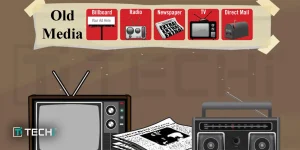Those of us who have been classically trained in journalism (from back in the days when journalism was more than blogging and posting videos to Twitter), it’s hard to see the decline of the world in which we once thrived. Writing for a local newspaper in the 80s showed me two things that I can say are amongst my most insightful perspectives:
- Journalism has always been an engine that drives revenues
- Real “journalists” were going to be replaced over time as technology improved
At the time I was called an apocalyptic freak. I believe those were the actual words used by an editor who was, at the time, in his 60s and is still alive today. Yes, I was correct on both counts; I wish I would have marked the date because it hasn’t happened very often since.
The infographic below that I found on TheNextWeb does a pretty good job at reflecting my perceptions of the trends in media today.





